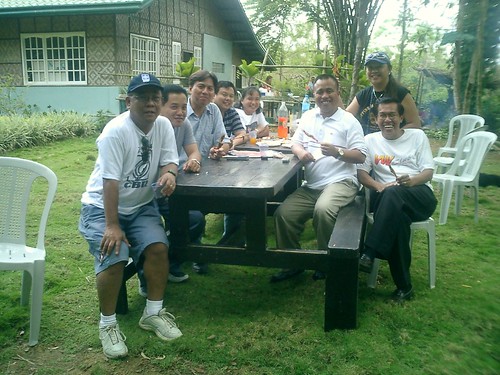Editorial : Last stand

The administration majority may not necessarily oblige them. Even if-as has been widely reported-the committee on justice under Rep. Simeon Datumanong submits its report to the plenary today, the Constitution allows the House of Representatives to calendar the "consideration" of the committee's resolutions "within 10 session days from receipt thereof."
It is quite possible that, in an attempt to arrest the momentum the pro-impeachment camp gained since the justice committee voted down all three impeachment complaints against the President last Wednesday, the House leadership will opt to delay the moment of reckoning.
Possible, but not likely. The decision of the House leadership to accelerate the pace of work in Datumanong's committee after the controversial walkout on Tuesday convinces us that the administration's strategy at this stage remains image-oriented: The plan is to ensure that President Macapagal-Arroyo does not face any formal charges when she presides over a rare UN Security Council summit on Sept. 14 in New York City.
Delaying consideration of the justice committee's report may mean moving the day of reckoning to after Sept. 19, when Congress resumes its session after a nine-day break. But we can see this happening only if the coming together of anti-Arroyo forces-symbolized by the meeting of former President Corazon Aquino, opposition icon Susan Roces, and Hyatt 10 leader Dinky Soliman at the inter-faith assembly in De La Salle University last Friday-gathers enough momentum by this afternoon to threaten the administration's strategy.
The real focus of attention, of course, remains the pursuit of the 79, or one-third of the House membership. But it is no longer enough to get their signatures. The pro-impeachment bloc in Congress needs at least 79 congressmen to show up today, ready to vote.
If the committee report is considered today, the pro-impeachment bloc needs to do either of the following: Muster at least 79 votes against the resolution rejecting the second and the amended complaints (thus keeping the amended complaint alive). Or muster at least 79 votes against the resolution finding the original Lozano complaint insufficient in substance (thus keeping the impeachment case itself alive). If the 79 votes are there, then in the view of constitutional expert Joaquin Bernas, S.J., the complaints will be returned to the justice committee for "formal investigation."
Will the young congressmen running the impeachment bloc rise to the occasion? We are not too sure, judging by Escudero's own pendulum metaphor. "We get three more [signatures], but two are deducted," he said. "This is probably the story of impeachment in the country."
But as Escudero knows all too well, this seesaw battle is most emphatically not the story of impeachment in our country. He himself was a part of the ultimately unsuccessful second impeachment case against Chief Justice Hilario Davide, which gained the support of more than one-third of the House membership before Speaker Jose de Venecia called for an early recess. The complaint against President Joseph Estrada reached the one-third mark in about two weeks. On the other hand, the complaints against election commissioner Luzviminda Tancangco and Ombudsman Aniano Desierto never came close to breaching the one-third level. The point is: In previous impeachment cases, the trend, whether for or against, was clear.
But the case against President Arroyo is a completely different kind of political conflict. Are Escudero and other young guns fighting this war with the wrong lessons from the past? It is unfortunate if they are, because the public's need remains the same: The most serious charges against the President must be formally investigated. That is the only way to end the crisis of legitimacy that now surrounds her. Does it really matter that she presides over the UN summit without the stain of impeachment charges? That is the price of democracy, which many other nations cannot even pay.







No comments:
Post a Comment